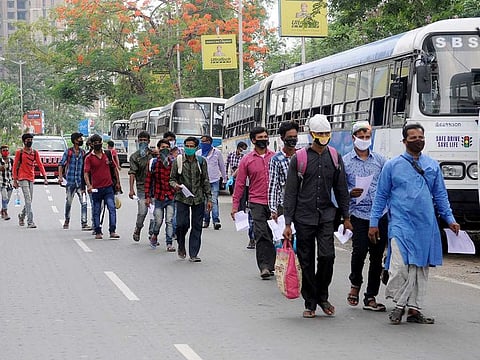Informal workers risk livelihoods being 'destroyed' by COVID-19: ILO
UN agency warns of the impact of coronavirus on the most vulnerable in the labour market

Geneva: Three-quarters of workers in the informal economy - some 1.6 billion people - risk having their livelihoods ruined by the coronavirus pandemic, the International Labour Organisation said Wednesday.
The ILO said an expected further sharp decline in working hours in the second quarter of 2020, due to the COVID-19 crisis, meant that those workers were in "immediate danger of having their livelihoods destroyed".
In its third report on the coronavirus crisis and the world of work, the UN agency warned of the impact on the most vulnerable in the labour market, who are often in the hardest-hit sectors.
The 1.6 billion people stand in line to suffer "massive damage to their ability to earn a living," said ILO director-general Guy Ryder.
"We all have to think of the human suffering, the human need that stands behind that extraordinary figure."
The ILO said the crisis was causing an unprecedented reduction in economic activity and working time.
It estimates that global working hours declined by 4.5 per cent in the first quarter of 2020, compared with the last three months of 2019.
Global working hours in the second quarter of 2020 are expected to be 10.5 per cent lower than in the last pre-crisis quarter, due to the extension of lockdowns.
The ILO said this was the equivalent to 305 million full-time jobs, representing a major deterioration on a previous second-quarter estimate of 195 million.
It said the Americas (down 12.4 percent), followed by Europe and central Asia (down 11.8 percent each) would be the regions losing the most working hours over the second quarter.
No income, no food
The ILO said the hardest-hit sectors would be accommodation and food services, manufacturing, wholesale and retail trade, and real estate and business activities.
"As the pandemic and the jobs crisis evolve, the need to protect the most vulnerable becomes even more urgent," said Ryder.
"For millions of workers, no income means no food, no security and no future.
"Millions of businesses around the world are barely breathing. They have no savings or access to credit.
"If we don't help them now, they will simply perish."
The ILO found the proportion of workers living in countries with recommended or mandatory workplace closures has decreased from 81 to 68 percent over the last two weeks - mainly driven by the lifting of workplace shutdowns in China.
However, the situation has worsened elsewhere, with workplace closure measures increasing.







